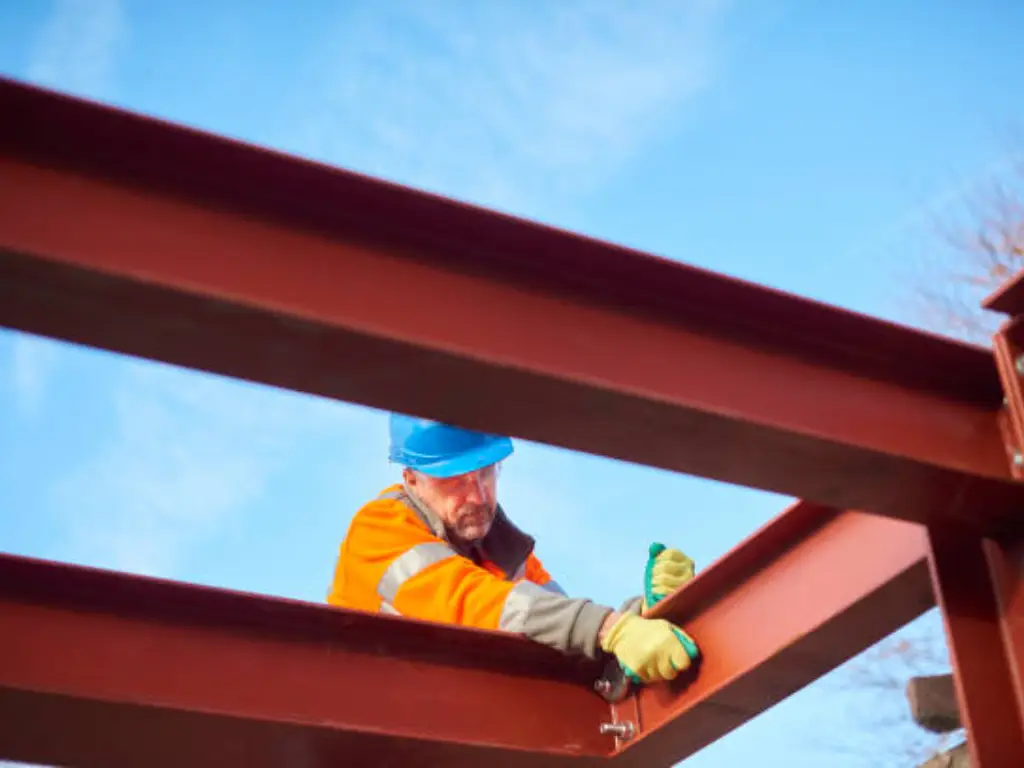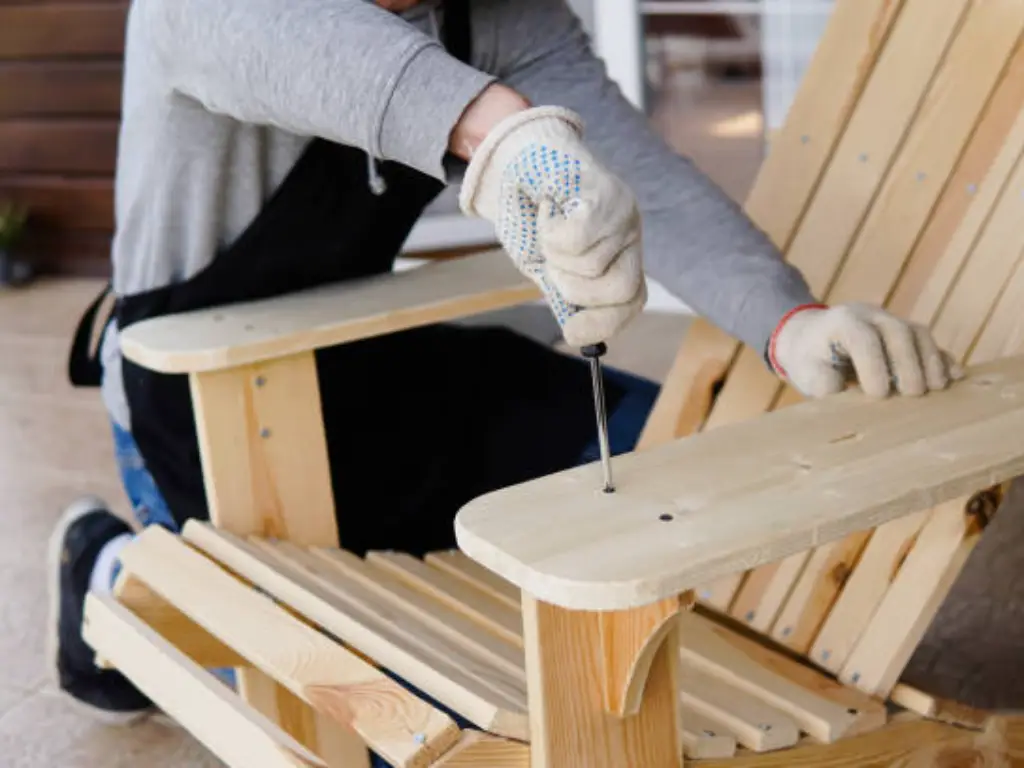What Are Construction Screws Used For?
You know, when it comes to construction projects, having the right screws is crucial. Construction screws, also known as structural screws or metal screws for sheet metal applications, are designed for heavy-duty applications. These screws are typically made of sturdy materials like stainless steel or hardened steel, making them super tough and able to handle some serious weight and stress, like securing framing, decking, and other load-bearing structures.

Different from regular wood screws, construction screws have deeper and more aggressive threads, allowing them to bite into the material and create a strong, long-lasting hold. Thus, they’re perfect for outdoor projects that need to withstand harsh weather conditions and intense wear and tear, including exterior projects that may involve hollow walls or specific applications requiring a sharp point for piercing through tough materials.
Applications of Wood Screws
While construction screws are the heavy hitters, wood screws still have their place in the game. These more basic fasteners, with their basic design, are ideal for lighter woodworking projects and indoor applications, like assembling furniture, installing cabinets, or securing a piece of wood or drywall.
Wood screws come in various types, such as coarse thread, fine thread, and even specialized drywall screws with a bugle shape for a flush finish. They’re usually made from cheaper materials like zinc or steel but get the job done for less demanding tasks.
What sets wood screws apart is their versatility and affordability, making them the go-to option for basic home repairs and DIY projects around the house, including the assembly of decks screws for those outdoor but less structurally demanding tasks.
Key Differences Between Construction and Wood Screws
Let’s break it down into simple points, highlighting the distinctions between construction screws and wood screws:
- Material: Construction screws are made of tough materials like stainless steel or hardened steel, suitable for sheet metal and metal screws applications. Wood screws are usually made of softer metals such as zinc or mild steel.
- Strength: Construction screws, or structural fasteners, have higher shear and tensile strength, making them better for holding heavy loads, including those required in specific building projects.
- Thread Design: Construction screws have deeper and more aggressive threads for superior holding power in wood and other materials. Wood screws have shallower and finer threads, designed for lighter tasks.
- Head Style: Many construction screws have a flat or bugle-shaped head, allowing for countersinking, while wood screws come in various head styles like flat, oval, or Phillips.
- Corrosion Resistance: Construction screws are often coated or made of corrosion-resistant materials, making them better for outdoor use and damp environments. However, standard wood screws are more prone to rust and corrosion over time.
- Cost: Construction screws, due to their specialized design and materials, tend to be more expensive than wood screws, but the higher cost ensures better durability and performance in different projects.
In summary, construction screws are tougher, stronger, and more durable, suitable for structural fasteners and specific applications, whereas wood screws are suitable for lighter tasks and are usually cheaper.
Strength and Load-Bearing Capacity
Construction screws are incredibly strong and made for heavy-duty work, including the ability to handle intense forces and support significant weight loads thanks to their sturdy materials and aggressive threading. They create a secure connection and can join wood, metal, or concrete components, making them ideal for exterior projects and specific building projects requiring a sharp point and high load-bearing capacity.
On the other hand, wood screws are designed for lighter work with a lower load-bearing capacity, suitable for moderate forces but not for the same level of stress as construction screws. Using wood screws in high-load situations may lead to failure and cause structural issues later on.

It is important to consider your project’s needs when choosing between construction screws and wood screws. For heavy-load applications like building a deck or framing a new addition, construction screws are recommended for their superior holding power and strength. However, for assembling a bookshelf or installing a door frame, wood screws are suitable and more cost-effective.
In summary, always consider the load requirements before choosing screws: construction screws for heavy loads and structural integrity, and wood screws for lighter applications. Matching the right screw to your project’s needs is essential for success.
Corrosion Resistance and Durability
Another important thing to think about is corrosion resistance and durability. You want your screws to last a long time, right?
Construction screws are often made from materials that resist corrosion. For example, stainless steel. Or, they have protective coatings. This makes them ideal for outdoor projects. They can handle moisture, rain, and even salty air near the coast. Construction screws are built to last. They can withstand harsh weather without rusting or breaking down.
| Feature | Construction Screws | Wood Screws |
| Corrosion Resistance | High (made from stainless steel or coated for protection) | Lower (prone to rust and corrosion over time) |
| Suitability for Outdoor Use | Ideal (can handle moisture, rain, and salty air) | Limited (not recommended for exposed outdoor use) |
| Durability | Built to last under harsh conditions without rusting or breaking down | May corrode or fail in damp or humid environments |
| Cost Effectiveness for Outdoor Projects | Higher upfront cost but less likely to need replacement | May require more frequent replacement |
On the other hand, standard wood screws are more likely to corrode over time. This is especially true in damp or humid environments. Wood screws may be okay for indoor woodworking projects. But using them outdoors or in very moist areas could cause premature rusting and failure.
So, if you’re working on an outdoor project like a deck, pergola, or outdoor furniture, it’s worth investing in durable, corrosion-resistant construction screws. They may cost a bit more upfront. However, they will save you from having to repair or replace them later on.
In summary, for outdoor projects, choose corrosion-resistant construction screws. They last longer in harsh conditions. For indoor projects, standard wood screws can work. Just be mindful of moisture levels. A little more money now can prevent costly replacements down the road.
Cost and Availability Comparison
Let’s be honest – cost is always important for home improvement projects. So, how do construction screws and wood screws compare in price and availability?
Generally, construction screws tend to be more expensive than wood screws. This is because they use higher-quality materials. The manufacturing process for their aggressive threads and heavy-duty design is also more specialized.
However, the cost difference is not always huge. You may pay a bit more per box or bucket of construction screws. But the price gap has narrowed in recent years as they have become more widely available.
Speaking of availability, wood screws are typically easier to find. You can purchase them at any hardware store, home center, or even some grocery or discount stores. On the other hand, construction screws may require a trip to a specialty hardware store or lumberyard. Though, they are becoming more readily available as they grow in popularity.
If you’re on a tight budget, wood screws may be the more cost-effective option for smaller projects or indoor applications. But, for larger, more demanding jobs, the added durability and strength of construction screws could be worth the extra investment in the long run.
In summary, construction screws are generally more expensive but becoming more available. Wood screws are cheaper and easy to find. For smaller budgets or indoor use, wood screws work well. But for demanding outdoor projects, investing in construction screws pays off over time.
Installation Tips for Construction Screws
Alright, so you’ve decided to go with construction screws for your heavy-duty project. Great choice! But installing them properly is key to ensuring a secure, long-lasting connection. Here are a few installation tips to keep in mind:
- Pilot Holes: Construction screws are beefy, so it’s always a good idea to drill pilot holes first. This will prevent the wood from splitting or cracking as you drive in the screws.
- Torque and Impact: These screws are designed to be driven in with a power drill or impact driver. Don’t try to muscle them in by hand – you’ll just end up with a sore arm (and maybe a headache).
- Countersinking: Many construction screws have flat or bugle-shaped heads that allow for countersinking. This creates a clean, flush finish and helps prevent the head from catching on anything.
- Proper Depth: Be careful not to overdrive the screws. You want them to be snug, but not so tight that they strip out or cause the wood to crack or split.
- Lubrication: For particularly dense or hardwood materials, using a bit of lubricant (like wax or soap) on the screw threads can make installation easier and reduce the risk of breaking or stripping.
Following these simple tips will help ensure a smooth installation process and a rock-solid connection that can withstand heavy loads and harsh conditions.
Installation Tips for Wood Screws
Wood screws may seem simple, but there are some tips to keep in mind:
- Pilot Holes: Like construction screws, drill pilot holes first. This is especially important for hardwoods. Pilot holes prevent the wood from splitting. They also make driving the screws easier.
- Countersinking: Depending on the project, you may want countersunk screw heads. This creates a flush, finished look. Use a countersink bit to do this.
- Screw Length: Choose the right length for the materials you’re joining. Screws that are too short won’t grip well. Screws that are too long risk hitting something on the other side.
- Lubrication: Use a dab of soap, wax, or lubricant. This helps prevent binding or stripping, especially in dense hardwoods.
- Driving Technique: Use a power drill or screwdriver with adjustable clutch. This avoids overdriving and stripping the screw heads.
While wood screws seem simple, taking the time to install them properly makes a difference. It ensures quality and longevity for your woodworking project.
In summary, follow these tips: drill pilot holes, countersink if needed, choose the right length, use lubricant, and adjust your driving technique. Taking these steps will give you the best results with wood screws.
Factors to Consider When Choosing Screws
There are many types of screws out there. It can be hard to know which ones are right for your project. Here are some key factors to consider when deciding between construction screws and wood screws:
Application: What will you use the screws for? Are you building a load-bearing structure like a deck or framing walls? Or is it a lighter woodworking project like assembling furniture? Match the screw type to what the application needs.
Strength Requirements: Will the screws need to hold up against significant forces or weight? If so, construction screws with their superior holding power and strength are likely the way to go.

Indoor vs. Outdoor: For outdoor projects exposed to moisture and weather, choose corrosion-resistant construction screws or coated deck screws. Standard wood screws may not last as long.
Material Compatibility: Think about the materials you’ll be joining. Some screws work better in hardwoods versus softwoods. Others are made for use in metal or concrete.
Cost and Budget: Construction screws cost more. If you’re on a tight budget, wood screws may be more cost-effective for lighter applications.
Aesthetic Considerations: The head style and finish of the screws can impact the overall look. Construction screws often have an industrial style. Wood screws come in various finishes to blend in.
By considering these factors, you can make an informed decision. Choose the right type of screw for your specific needs. This will ensure a secure, long-lasting result.
What About Construction Screws Vs Deck Screws?
You might be wondering, “What about deck screws? How do they compare to construction screws?” Well, let me break it down for you:
Deck screws are a specialized type of construction screw designed specifically for outdoor deck building and framing applications. Like their construction screw cousins, they’re made of corrosion-resistant materials like stainless steel or coated steel to withstand the elements.
However, deck screws often have additional features that make them well-suited for their intended purpose. Things like:
- Reverse buttress threads that help prevent moisture intrusion and wood swelling/shrinking
- Wider, more aggressive threads for superior grip in wood
- Specialty head designs (like star drive or square drive) that resist cam-out and stripping
So, while construction screws and deck screws share some core similarities in terms of strength and durability, deck screws are optimized specifically for outdoor deck framing and other exterior woodworking projects.
If you’re building a deck, pergola, or any other outdoor structure that needs to withstand rain, snow, and harsh weather conditions, deck screws are likely the best choice. But for interior framing or load-bearing applications not exposed to the elements, standard construction screws may be a more cost-effective option.
Make the Right Choice
When the day ends, you have to choose between two types of screws based on your project’s needs.
First, think about your project. Is it a big project that needs to support a lot of weight? Or will it be outside facing rain and sun? If yes, you should use construction screws. These are also called deck screws when used for decks. Construction screws are strong. They hold things together well and don’t rust easily. This makes them great for tough projects. They might cost more at first, but they last longer. This can save you money and worry in the long run.
However, not all projects need such strong screws. If you’re making something small or for inside the house, and it won’t get wet or hold much weight, wood screws are fine. They are cheaper, which is good for your wallet.
In conclusion, choosing the right screw is about understanding your project. Think about how strong the screws need to be, where the project will be, and how much you want to spend. This helps you make a smart choice. If you’re not sure which screws to pick, ask for help. Experts at the hardware store know a lot. They can help you find the perfect screws for your project.






